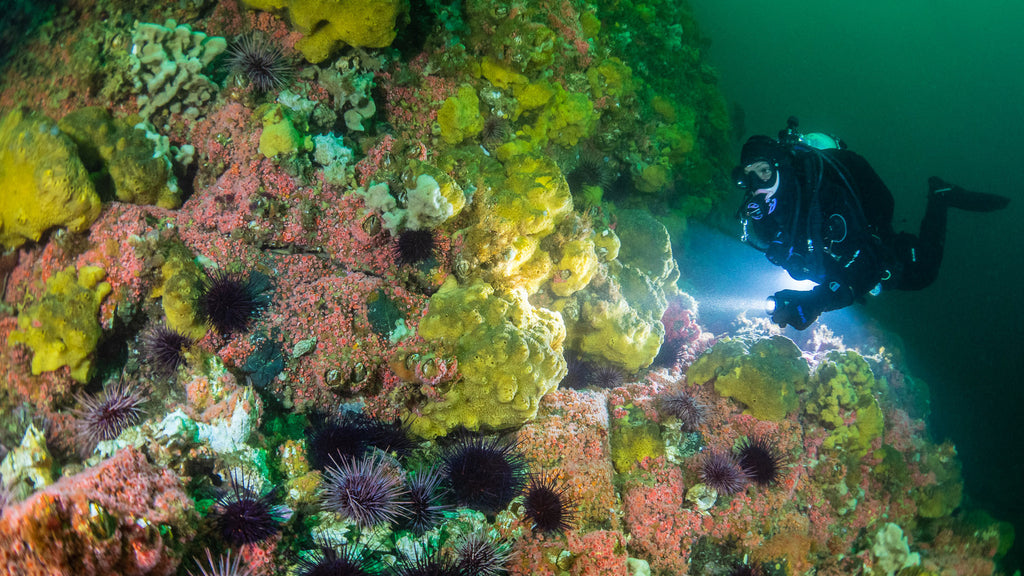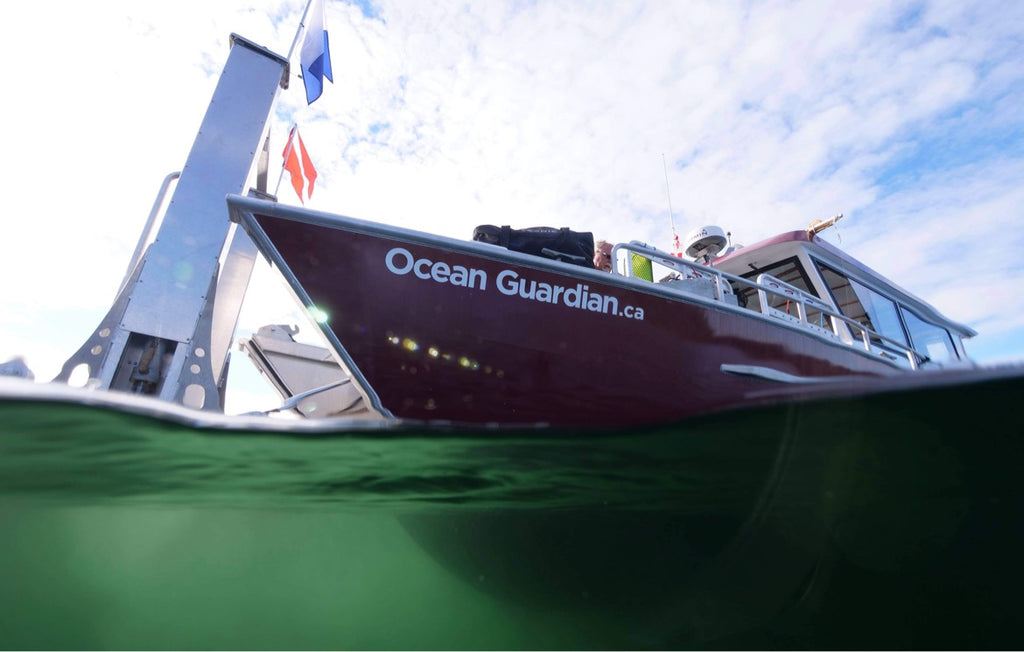5 Reasons You Should Dive in Campbell River, British Columbia
Most British Columbians have no idea about the world-class diving that is right on their doorstep. Vancouver Island, specifically Discovery Passage near Campbell River, has some of the best diving in the world. Here's 5 reasons why.
1. CONDITIONS
The first thing most people think about diving in British Columbia is "isn't it cold and dark?". Cold? Yes. There's no denying that. But dark? Absolutely not.
Campbell River is one of the lucky places in British Columbia that is minimally affected by spring algal blooms. Substantial tidal currents keep the water constantly mixing and moving, thus never giving it enough time to stop, warm up, and create the huge blooms of phytoplankton that thrive in warmer waters. In the winter, expect 30m/100ft visibility. In the spring and summer, expect 12m/40ft visibility. We'll call that a win!

Going back to the "cold" part of "cold and dark". Yes, the water is cold here. It's Canada; what do you expect? However, when you wear the proper exposure protection, you won't even notice the cold.
Usual summer temperatures are 12C, and winter temperatures are 8C. The currents are constantly mixing the colder deep water with the warmer surface water, keeping the temperature quite consistent year-round.
You can dive in a wetsuit in the summer, and drysuit in the winter. Most people dive in drysuits year-round for comfort and warmth. Being sealed off from the water during the dive and completely dry after a dive is something we all cherish. It's incredibly rewarding to brave the cold and witness the world-class diving we have right on our doorstep.
Without fail, when people finish their first dive in Campbell River, they always say, "That wasn't as cold as I expected!".
2. DIVERSITY
From walls, to wrecks, to muck dives, to night dives... Campbell River has it all. Regardless of the type of dive you're doing, the marine life is colourful and abundant.
Wall dives line the west side of Quadra Island. Most of these dives will be drift dives, as they're exposed to the main current in Discovery Passage. Row and be Damned, Copper Cliffs, Steep Island, Seymour Narrows, and Whiskey Point are examples.

There are 2 wreck dives in Discovery Passage. The HMCS Columbia was sunk in 1996 by the Artificial Reef Society of BC beside Seymour Narrows. Tucked away from the currents, you can dive this ex-naval destroyer escort at any time. Make sure you have your Advanced Open Water, as minimum depths are 18m/60ft! The May Island Wreck is a retired BC Ferries double-ender ferry that was sunk off May Island. As it's quite shallow (maximum 12m/40ft), kelp grows in abundance on the ferry in the summer, and harbour seals tend to reside within the safety of the wreck.

Muck dives can be home to a wide variety of life including octopus, squid, nudibranchs, and even the elusive Spiny Pacific Lumpsucker. Quathiaski Cove and Argonaut Wharf are phenomenal muck dives.

You can night dive anywhere in Campbell River, but Argonaut Wharf is our favourite. Accessed from boat or shore, you can find octopus, grunt sculpins, lumpsuckers, rockfish, lingcod, soft corals, sponges, and anemones.

3. ABUNDANCE
Jacque Cousteau named Northern Vancouver Island the best diving in the world, second only to the Red Sea. Those currents we were talking about earlier? They are incredibly nutrient-rich and make the area profoundly productive and abundant. Most sites in Discovery Passage are so covered in life, that there isn't a spot to put a finger down.

Macro life and giants abound. Fields of strawberry anemones, sponges, and soft corals carpet the walls and bottom. Hanging close to the wall are schools of rockfish and perch. You can find Giant Pacific Octopus and wolfeels hiding in cracks and caves. In the summer, bull kelp forests create impressive forests where harbour seals tend to reside. And on top of all this, the great visibility makes the waters bright. You'll think you're in the tropics, just a few degrees colder!
On your surface interval, you can find orcas, humpbacks, sealions, porpoises, and eagles.

Because of the great visibility and plethora of marine life, Campbell River is every underwater photographer and videographers' dream destination.
Never been diving in Campbell River? Hire a divemaster! They'll help to make your experience more safe and fun, and point out all the amazing marine life that most people would swim right over.
4. TRAINING
Learning to dive in Campbell River can be extremely rewarding and beneficial. Drysuits, extra weight, and cold water can make it challenging, but overall will make you a better diver.

When taking a course with us, we teach you how to safely dive in mild to moderate current. Our boat captains, instructors, and divemasters are very experienced with local tides and currents and will go out of their way to make your diving experience a safe and fun one. We also teach you how to dive in a drysuit, and include thermal undergarments to make your Campbell River diving experience more warm and comfortable.
If you're looking to get certified, take a look at the PADI Open Water Course. If you're already certified but wanting to start diving in Campbell River, check out the PADI Drysuit Specialty.
5. ACCESSIBILITY
The city of Campbell River is widely accessible, yet so close to nature and world-class dive sites.
If you're coming from Vancouver, it's only a short ferry ride to Nanaimo and a 1.5hr drive from there. If you're coming by plane, the Comox airport is only a 30 minute drive from Campbell River. Don't have a car? The Island Link Bus can take you to and from ferry terminals or airports.
A plethora of hotels, Air BNB's, campsites, and cabins nearby restaurants, our dive shop, and the Fisherman's Wharf where our boats are docked. Our favourite accommodations are the Anchor Inn, Painter's Lodge, and Oyster Bay Resort.
If you don't have your own gear, renting gear from us is quick and easy.

A number of dive charter operators exist in Campbell River, including Ocean Guardian Dive Charters (Oceanfix.ca Dive Centre), Abyssal Diving Charters, and Big Animal Encounters.
The dive sites in Discovery Passage are no more than a 20 minute boat ride from Campbell River.
